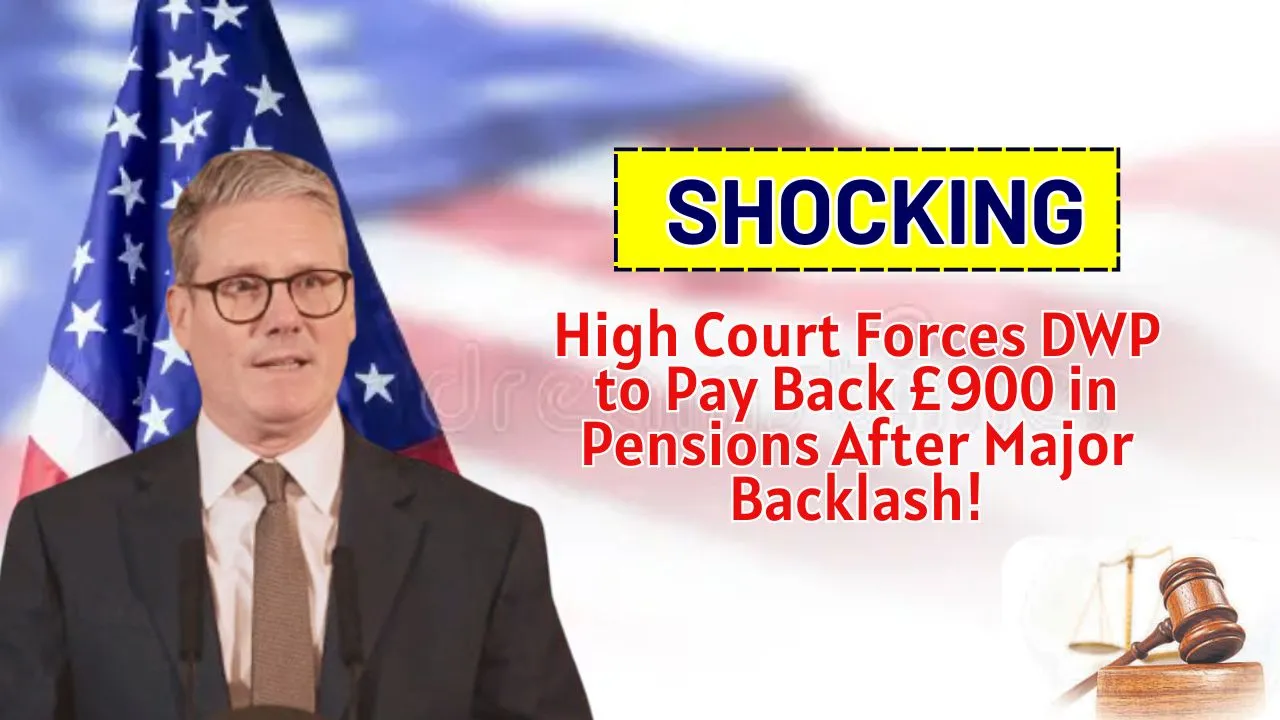DWP £900 Pension Back Pay: In a powerful ruling that has shaken government departments and reignited debates on pension justice, the High Court has ordered the Department for Work and Pensions (DWP) to repay roughly £900 in back pay to thousands of British pensioners. The decision followed months of public criticism over an adjustment made by the DWP that significantly impacted pensioners living on fixed incomes.
The DWP £900 Pension Back Pay ruling was driven by a legal challenge supported by pensioners’ rights groups and MPs, which uncovered that the changes made to pension credit calculations were implemented without adequate notice or explanation. The court found this not only breached procedural fairness but also led to serious financial hardship among elderly citizens. Now, affected pensioners can expect repayments and the restoration of their previous pension levels.
DWP £900 Pension Back Pay
The DWP £900 Pension Back Pay decision came after the High Court determined that recent pension calculation changes introduced by the DWP caused widespread hardship and were rolled out without proper notification. Affected pensioners had seen average reductions of £15 per week—seemingly minor but deeply impactful for those already stretched thin.
This court ruling doesn’t just demand financial restitution. It mandates structural change in how DWP communicates with vulnerable populations and enforces safeguards to prevent similar failures in the future. Here’s everything you need to know—from who’s eligible to what steps pensioners should take next.
Overview Table: Key Facts on DWP £900 Pension Back Pay
| Feature | Details |
| Issue | Unlawful pension credit adjustments |
| Court Verdict Date | May 2025 |
| Average Repayment | £900 per affected pensioner |
| Number of Pensioners Affected | Over 400,000 |
| Back Pay Covers | Approx. 60 weeks of underpaid pension credit |
| Primary Cause | Lack of notification and breach of duty of care |
| Key Legal Backing | 1992 Social Security Administration Act |
| Groups Involved in Legal Action | AgeUK, Public Law Project |
| DWP Response | Accepted ruling, no appeal planned |
| Implementation Timeline | Repayments to begin within 60 days |
What Led to the High Court Ruling?
The controversy began last autumn when the DWP implemented a technical change to pension credit calculations. While the department framed it as a minor correction, it reduced payments for over 400,000 pensioners. On paper, it looked like an adjustment—but in reality, it took vital money out of the hands of those who needed it most.
The government claimed it was correcting an overpayment error, but legal experts and advocacy groups saw a different picture. The 1992 Social Security Administration Act mandates clear communication and adequate notice before any benefit reduction. But as the court discovered, many pensioners received no warning at all, or letters too vague to explain the real impact.
Impact on Pensioners and Public Response
The backlash was swift. Reports emerged of pensioners unable to afford heating, medication, or basic food. One pensioner from Leeds shared how the payment cut meant choosing between prescription costs and keeping warm. Stories like this echoed across the UK, exposing the harsh realities behind policy decisions made without public consultation.
Pension rights groups like AgeUK and Public Law Project sprang into action, gathering evidence and personal testimonies. Their legal team argued that the policy change created undue hardship and violated statutory obligations to safeguard vulnerable citizens. The High Court agreed, calling DWP’s approach a “serious breach of procedural fairness.”
What the Court Ordered the DWP to Do
In a strongly worded judgment, Lord Justice Harrington laid out the necessary corrections:
- Reverse the changes and restore original pension payment levels.
- Pay back approximately £900 on average to each affected pensioner.
- Simplify the claims process so the burden is on DWP, not elderly claimants.
- Review future policy processes to ensure vulnerable citizens receive adequate notice and support.
This wasn’t just a scolding—it was a call for systemic change.
Who Is Eligible for the £900 Pension Back Pay?
If you or someone you know is receiving standard pension credit and noticed a payment reduction between September and December 2024, you are likely included in the eligible group.
To confirm eligibility:
- Check your bank statements for payment changes in that period.
- Look for any communication from DWP about benefit adjustments.
- Watch for the government’s online portal launching within 2 weeks to track eligibility and repayment.
Steps Pensioners Should Take Now
While the DWP has committed to automatic repayments, history shows that being proactive helps. Here’s what to do:
- Gather records of pension changes (letters, bank statements).
- Register on the upcoming DWP portal to monitor your status.
- Seek help from organizations like AgeUK or Citizens Advice if you don’t receive communication within 90 days.
- Report delays or difficulties using the hotline set up by AgeUK.
Broader Implications of the Ruling
This case has significant legal and political ripple effects. Not only does it set a precedent for how DWP must treat vulnerable recipients, but it also raises questions about other recent benefit changes. The Treasury is reportedly concerned about the unplanned £360 million repayment cost.
In Parliament, the Work and Pensions Select Committee has launched a formal inquiry into DWP decision-making. There is now cross-party agreement that procedural fairness must be embedded in welfare policy, not treated as an afterthought.
Why This Case Matters
Beyond the financial aspect, this ruling is about dignity and justice. As John Carter from the Pensioners Rights Coalition put it: “It’s not just about the money. It’s about respect for people who gave their lives to this country’s workforce.”
The case has also highlighted deeper issues in the system—like the fact that access to justice required crowdfunding and pro bono legal support. Without these, many vulnerable people might never have had their voices heard.
Final Thought
The DWP £900 Pension Back Pay ruling isn’t just a victory in the courtroom. It’s a powerful reminder that government systems must serve the people fairly and transparently. For pensioners, the repayment will help recover lost income—but the wider win is restoring faith that injustice can be challenged.
As repayments roll out over the coming weeks, pensioners are encouraged to stay informed and act early if their payment doesn’t arrive. If this guide helped you, consider sharing it with others who may benefit, and follow updates from trusted sources like AgeUK and the official DWP portal.











